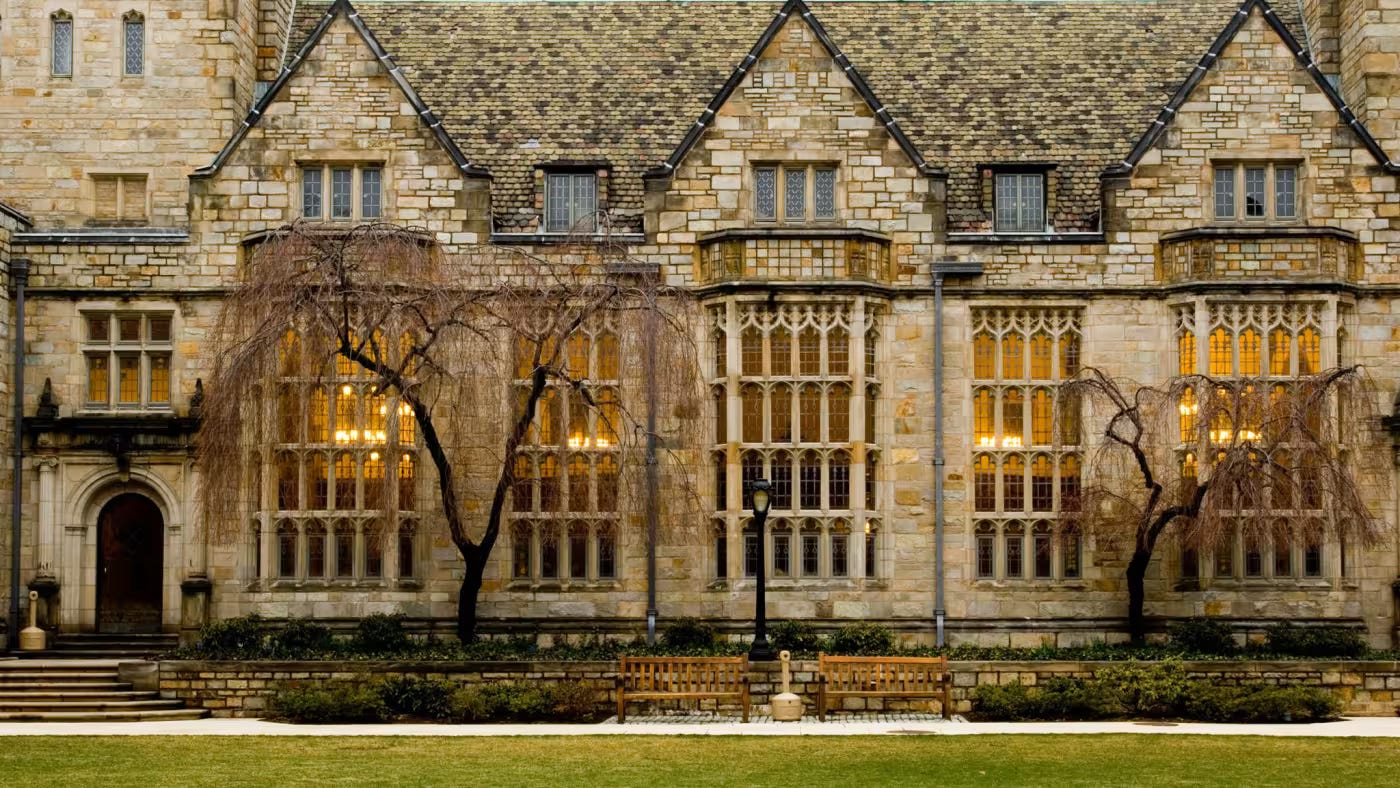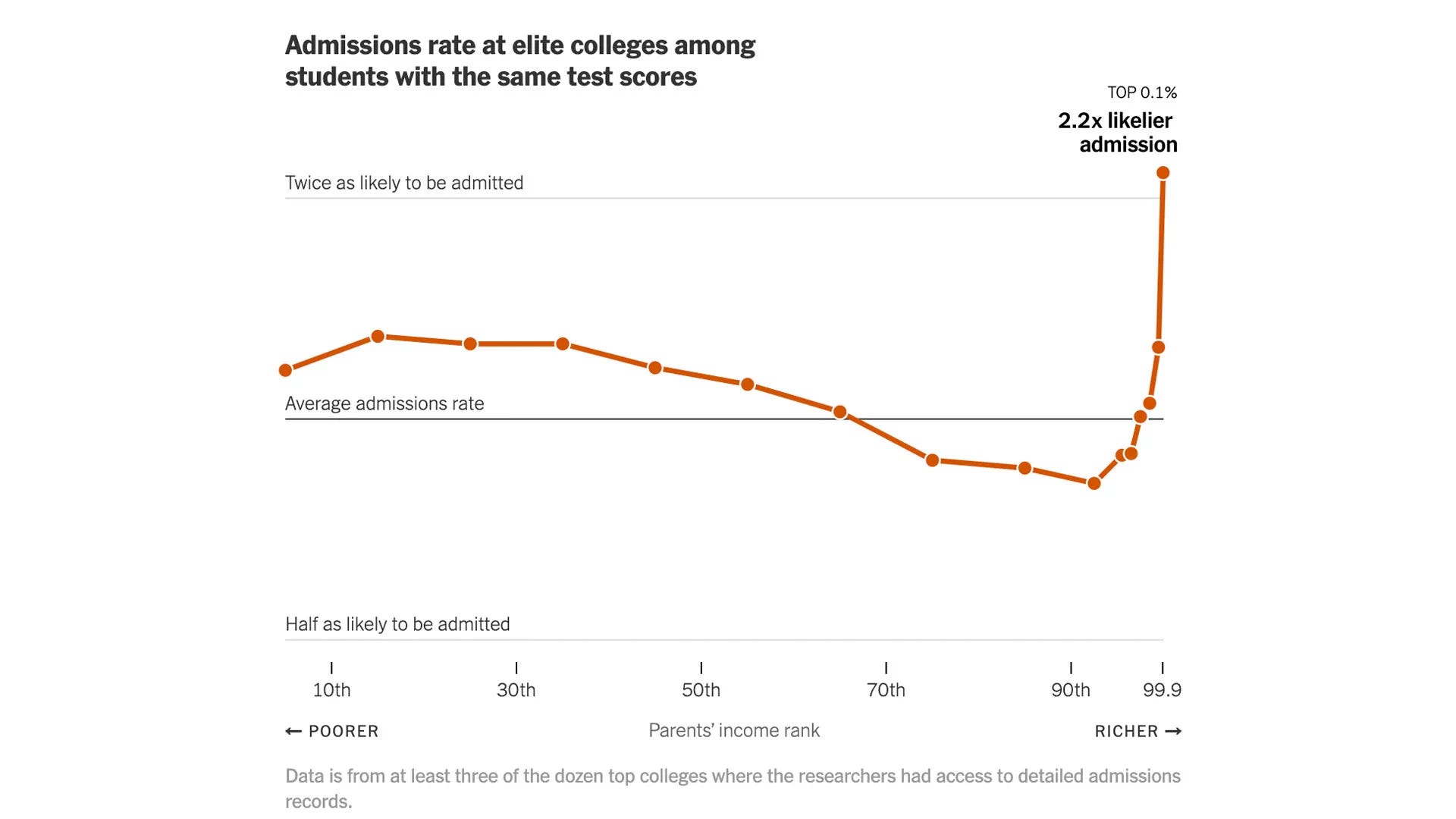Elite College Admissions Are Based More On Wealth Than Brains...
Welcome to The Poverty Trap: Why the Poor Stay Poor in America. I’m thrilled that you signed up to read my newsletter, and I hope that you will enjoy participating in our community. Everyone deserves the opportunity to thrive in our country, and we can work together to make that happen. Please share this newsletter with your friends and family when you have a spare minute. Thanks! If you have the means, do upgrade your subscription to Paid—your financial support of my writing will help me to continue and expand the newsletter!
Elite College Admissions Are Based More On Wealth Than Brains...Think: The Rich Favoring Their Own And Perpetuating Wealth InequalityThis post goes out to both free and paid subscribers, but if you are not already a paid subscriber and value this effort and our growing community, please consider upgrading to a paid membership. Thanks in advance for your financial support of my work —it’s what allows me to keep researching and writing — not kidding! “For applicants with the same SAT or ACT score, children from families in the top 1 percent were 34 percent more likely to be admitted than the average applicant, and those from the top 0.1 percent were more than twice as likely to get in.” The New York Times, July 24, 2023. Maybe it’s because I still carry a chip on my shoulder that the recent report from researchers at Opportunity Insights, struck a disillusioning chord with me. I managed to attended a perfectly good public university, but as a teenager, I had grander plans for myself and my education. My father died suddenly at the beginning of my senior year of high school, just as we were talking about where I might attend college. In fact, it was the last conversation we had before he died of a heart attack the next day. As a reminder, in the 1970’s , living in a steel town and from a lower middle-class family, you weren’t prepped for college while still in diapers. The only college application I made was to the massive public university a few hours away from my home because friends from my high school were going there, and I knew I could hitch rides home for the holidays. I also could get tuition and room and board paid in full through a work-study program, because after my father’s death our family had no income except Social Security. At the time I applied in early 1976, this university accepted everyone who graduated from an Ohio high school and was still breathing when they arrived on campus. If I knew enough at the time to apply elsewhere, could I have been accepted to an “elite”, private college, and if I had, would I have succeeded? I’ll never know the answers to those questions, but what is important today is that students from low income backgrounds simply don’t have the same chance as the wealthy (generally defined as a family making $611,000 or more a year, and the ultra-rich or 1%, who earn millions or even billions each year) to attend a college with nationally and internationally known professors, smaller classes, more help to graduate and obtain an advanced degree, and eventually higher paying, more influential career opportunities. Although there is a small percentage of students from poor or middle class families admitted to Ivy League colleges, for example, this recent study shows it is a disproportionate share of the wealthy and ultra-wealthy students (with similar test cores as their lower income peers) who attend these colleges and reap the benefits. The New York Times invites us to explore “How Income Influences Attendance at 139 Top Colleges”, based on a 2023 report prepared, of course, by Ivy League economists under the direction of Opportunity Insights., the non-profit mentioned above. The researchers conducted a broad review of anonymous admission data from these colleges alongside IRS tax information, and cross-referenced with SAT/ACT scores from 1999-2015. The researchers wanted to answer these questions: “ Do highly selective private colleges amplify the persistence of privilege across generations by taking students from high-income families and helping them obtain high-status, high-paying leadership positions, and whether changes to admission policies of these top institutions would lead to greater diversity of our leaders.” Based on the following facts:
This is not a difficult report to read and understand and well worth your time, but the quick answers to the questions the researchers posed are “Yes” and “Yes”.
The researchers pinpointed three reasons students from wealthy families were much more likely to apply to and be accepted at these elite institutions:
“The persistence of privilege across generations” is an interesting way of saying “Keeping the rich, rich and the poor, poor”, and that is exactly what these longstanding admission practices do. Generally, if your parents attended an elite college, chances are you will, too. When top colleges give preference to legacy applicants are they influenced by the money your parents have already donated, the full cost of attendance your parents will pay without the need for pesky federal aid? And what about the continued amounts you will, in turn, donate to the college once you have achieved influence and wealth thanks to graduating from their elite college. Will you have a campus building named after you? Should whether your parents and/or grandparents attended a top tier college be a criteria at all in your acceptance? Thankfully, the preference for legacy applicants have been dropped by a few colleges, like Wesleyan University in Connecticut and M.I.T. and Amherst Colleges, in the wake of the U.S. Supreme Court decision last year striking down affirmative action criteria in college admissions. The economists also determined that colleges give extra weight to the type of high schools the student applicants graduated from in a round about way—college criteria for admittance often includes “non-academic” factors like extracurricular activities, recommendations and personal essays. The scores for this criteria typically are higher for private, non-religious high schools. So even if you live in an affluent neighborhood and send your children to excellent public schools funded by exorbitant property taxes, your children do not have the same “leg up'“ to attend a highly selective college as do students from private schools. ¹
According to an article from Axios discussing this same report and referencing The New York Times article, this preference for the ultra-wealthy, legacy applicants and applicants from elite, private high schools (all of whom are disproportionally white) amounts to affirmative action for the wealthy.
It all comes back to money and wealth. Both government and the private sector, by their laws, policies and ways of thinking perpetuate both the cycle of poverty and the “amplification” of wealth and privilege — two sides of the same coin. This report and analyses lead me directly to student loan forgiveness, and to those who begrudge freeing a small portion of student loan debt in certain circumstances. Do you see how release of at least some student loan debt is an attempt to level the playing field and how much that forgiveness matters to students without the legacy of wealth? _____________________________________ I’d love to hear your ideas on all of this, all sides. Please leave your thoughts in the Comment Section below to get the conversation started—thanks! And as always… 1 A second New York Times article takes a deeper dive into the possible reasons why private schools tend to be funnels to elite higher education. You’re on the free list for The Poverty Trap: Why the Poor Stay Poor In America. All posts are free for now, but if you’d like to join the crowd, please support my work by becoming a paid subscriber. |
Older messages
President Biden And Poverty:
Friday, May 17, 2024
Listen now (12 mins) | How His Administration Is Making A Difference ͏ ͏ ͏ ͏ ͏ ͏ ͏ ͏ ͏ ͏ ͏ ͏ ͏ ͏ ͏ ͏ ͏ ͏ ͏ ͏ ͏ ͏ ͏ ͏ ͏ ͏ ͏ ͏ ͏ ͏ ͏ ͏ ͏ ͏ ͏ ͏ ͏ ͏ ͏ ͏ ͏ ͏ ͏ ͏ ͏ ͏ ͏ ͏ ͏ ͏ ͏ ͏ ͏ ͏ ͏ ͏ ͏ ͏ ͏ ͏ ͏ ͏ ͏ ͏ ͏ ͏
A Mish-Mash Of End-Of-Month Readings:
Wednesday, May 1, 2024
"End Stage Poverty", Working Past Retirement & How White Folks Benefit From Racism ͏ ͏ ͏ ͏ ͏ ͏ ͏ ͏ ͏ ͏ ͏ ͏ ͏ ͏ ͏ ͏ ͏ ͏ ͏ ͏ ͏ ͏ ͏ ͏ ͏ ͏ ͏ ͏ ͏ ͏ ͏ ͏ ͏ ͏ ͏ ͏ ͏ ͏ ͏ ͏ ͏ ͏ ͏ ͏ ͏ ͏ ͏ ͏ ͏ ͏ ͏ ͏
This Is What We Choose To Preserve...
Monday, April 29, 2024
Listen now (13 mins) | For This Earth Day, Arbor Day And Beyond ͏ ͏ ͏ ͏ ͏ ͏ ͏ ͏ ͏ ͏ ͏ ͏ ͏ ͏ ͏ ͏ ͏ ͏ ͏ ͏ ͏ ͏ ͏ ͏ ͏ ͏ ͏ ͏ ͏ ͏ ͏ ͏ ͏ ͏ ͏ ͏ ͏ ͏ ͏ ͏ ͏ ͏ ͏ ͏ ͏ ͏ ͏ ͏ ͏ ͏ ͏ ͏ ͏ ͏ ͏ ͏ ͏ ͏ ͏ ͏ ͏ ͏ ͏ ͏ ͏ ͏ ͏ ͏ ͏
A Robust Industrial Policy
Monday, April 15, 2024
Listen now (14 mins) | To Temper Inequality, Tackle The Climate Crisis And Act For The Common Good ͏ ͏ ͏ ͏ ͏ ͏ ͏ ͏ ͏ ͏ ͏ ͏ ͏ ͏ ͏ ͏ ͏ ͏ ͏ ͏ ͏ ͏ ͏ ͏ ͏ ͏ ͏ ͏ ͏ ͏ ͏ ͏ ͏ ͏ ͏ ͏ ͏ ͏ ͏ ͏ ͏ ͏ ͏ ͏ ͏ ͏ ͏ ͏ ͏ ͏ ͏
A Few Weekend Readings: (Somewhat) Good Climate News, Dollar Stores Are Closing, and Medicaid Takes Your Home Post…
Sunday, March 24, 2024
Listen now (10 mins) | This post goes out to both free and paid subscribers, but if you are not already a paid subscriber and value this effort and our growing community, please consider upgrading to a
You Might Also Like
This Dreamy Dress Trend Will Be Everywhere In 3 Months
Friday, February 28, 2025
Fairytale moments from London Fashion Week. The Zoe Report Daily The Zoe Report 2.27.2025 This Dreamy Dress Trend Will Be Everywhere In 3 Months (Runway) This Dreamy Dress Trend Will Be Everywhere In 3
3x3: February 27, 2025
Friday, February 28, 2025
February is the worst month ͏ ͏ ͏ ͏ ͏ ͏ ͏ ͏ ͏ ͏ ͏ ͏ ͏ ͏ ͏ ͏ ͏ ͏ ͏ ͏ ͏ ͏ ͏ ͏ ͏ ͏ ͏ ͏ ͏ ͏ ͏ ͏ ͏ ͏ ͏ ͏ ͏ ͏ ͏ ͏ ͏ ͏ ͏ ͏ ͏ ͏ ͏ ͏ ͏ ͏ ͏ ͏ ͏ ͏ ͏ ͏ ͏ ͏ ͏ ͏ ͏ ͏ ͏ ͏ ͏ ͏ ͏ ͏ ͏ ͏ ͏ ͏ ͏ ͏ ͏ ͏ ͏ ͏ ͏ ͏ ͏ ͏ ͏ ͏ ͏ ͏ ͏
Should You Do Cardio Before or After You Lift Weights?
Thursday, February 27, 2025
View in Browser Men's Health SHOP MVP EXCLUSIVES SUBSCRIBE Should You Do Cardio Before or After You Lift Weights? Should You Do Cardio Before or After You Lift Weights? If you're combining two
This Google Tool Can Hide Your Personal Info From Search
Thursday, February 27, 2025
Alexa Is Getting an AI Upgrade. Take your privacy back from Google Search. Not displaying correctly? View this newsletter online. TODAY'S FEATURED STORY This Google Tool Can Help Hide Your Personal
“Shakespearean Red,” Dirty Blonde, & More Of Spring’s Biggest Hair Color Trends
Thursday, February 27, 2025
Plus, the spiritual meaning of the new moon, your daily horoscope, and more. Feb. 27, 2025 Bustle Daily LIFE Did Smart Phones Make Us All Stream-Of-Consciousness Texters? Sajina Shrestha self-
Her Student Loans Were Forgiven. Then They Came Back.
Thursday, February 27, 2025
Today in style, self, culture, and power. The Cut February 27, 2025 PERSONAL FINANCE She Thought Her Student Loans Were Gone. Then They Came Back to Haunt Her. Student borrowers are seeing ghost loans
How fast-food apps took over the drive-thru
Thursday, February 27, 2025
Around the world, King Cake inspires community
"Love remains a jewel in the hand, guarded"
Thursday, February 27, 2025
͏ ͏ ͏ ͏ ͏ ͏ ͏ ͏ ͏ ͏ ͏ ͏ ͏ ͏ ͏ ͏ ͏ ͏ ͏ ͏ ͏ ͏ ͏ ͏ ͏ ͏ ͏ ͏ ͏ ͏ ͏ ͏ ͏ ͏ ͏ ͏ ͏ ͏ ͏ ͏ ͏ ͏ ͏ ͏ ͏ ͏ ͏ ͏ ͏ ͏ ͏
Win Two Tickets To A Major Music Festival & A Shopping Spree!
Thursday, February 27, 2025
Thanks To Marshalls. Feb. 27, 2025 Bustle Daily Enter To Win Tickets To A Major Music Festival, Thanks To Marshalls Presented by Marshalls Enter To Win Tickets To A Major Music Festival, Thanks To
Cat Story
Thursday, February 27, 2025
How we got that cat ͏ ͏ ͏ ͏ ͏ ͏ ͏ ͏ ͏ ͏ ͏ ͏ ͏ ͏ ͏ ͏ ͏ ͏ ͏ ͏ ͏ ͏ ͏ ͏ ͏ ͏ ͏ ͏ ͏ ͏ ͏ ͏ ͏ ͏ ͏ ͏ ͏ ͏ ͏ ͏ ͏ ͏ ͏ ͏ ͏ ͏ ͏ ͏ ͏ ͏ ͏ ͏ ͏ ͏ ͏ ͏ ͏ ͏ ͏ ͏ ͏ ͏ ͏ ͏ ͏ ͏ ͏ ͏ ͏ ͏ ͏ ͏ ͏ ͏ ͏ ͏ ͏ ͏ ͏ ͏ ͏ ͏ ͏ ͏ ͏ ͏ ͏ ͏ ͏ ͏ ͏


